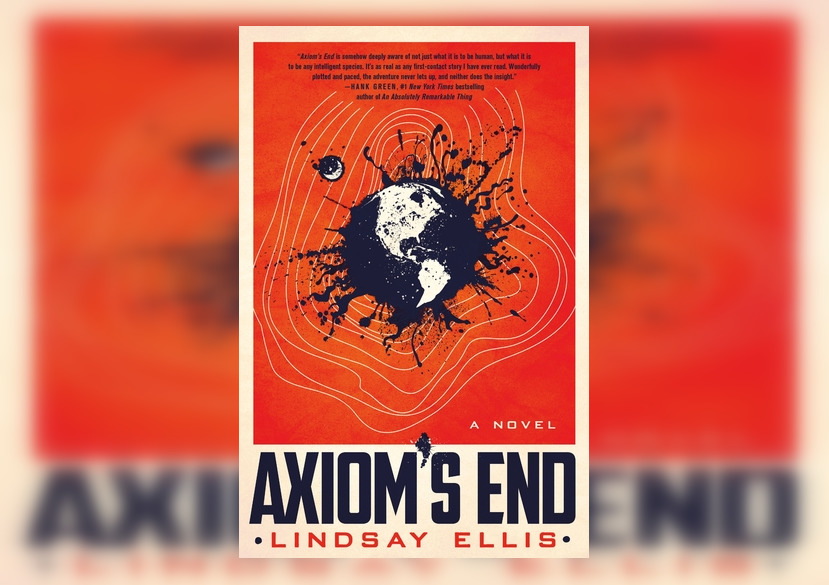Those familiar with Lindsay Ellis likely came to know of her in the context of media criticism. Her snarky and infinitely meme-worthy video essays covering Disney and The Hobbit, among other topics, draw millions of views on YouTube and netted her a Hugo Award nomination in the process. But behind the scenes, Ellis has been brewing up Axiom’s End, a sci-fi thriller that grapples with timely questions about our civilization while its hero grapples with aliens.
Axiom’s End is a book that initially cloaks its intellectuality in the tropes of genre, drawing readers into what appears to be the kind of story with which voracious science-fiction fans are well acquainted about a young protagonist (here Cora Sabino, a college dropout with a world-famous Julian Assange analog for a father) onto whom the responsibility of first contact with an alien species is thrust. Only after establishing this rhythm does the novel reveal its true intent: a mind-bending exploration of the human condition, shaped through the lens of late 2000s geopolitics. As the United States government tries to cover up the fact that it is harboring the last refugees of an alien genocide, the secret becomes too great for the systems that suppressed it to contain. All the while, readers are made to grapple with Big Questions about the dangers of cross-species (here an erstwhile stand-in for cross-cultural) communication, and the will of humans to force our likeness onto those around us.
Ellis’s prose style is compelling, though not ornamented, and her style lies not so much at the sentence level as at the level of wit. (Small spoiler warning: almost all the “website links” in this book lead directly to the music video for Rick Astley’s 1987 single, “Never Gonna Give You Up”.) Set in 2007, the background of the text is densely packed with mid to late 2000s pop culture staples, from Nickelback to Assassin’s Creed. It is at moments such as these that readers will be made vividly aware that Ellis first made a name for herself on YouTube, and they imbue her work with a fresh sensibility to the way it will be received by the kinds of audiences who congregate online. It’s an approach that some might pooh-pooh instinctively, but it becomes effective on the page in a way that’s hard to deny. Whole pages are spent establishing that yes, things A, B, and C would actually happen if the government were secretly harboring aliens and doing a bad job of keeping it a secret. In the hands of a different writer, it is easy to imagine these pages becoming laborious, but Ellis brings a kinetic energy that carries each scene through with foregrounded character dynamics which obscure the rhetorical function of these scenes. At no point is the prose working on one level alone, and even these spots carry narrative weight.
The substance of the novel takes place mainly in the burgeoning relationship between its protagonist and close third perspective, Cora, and the extraterrestrial Ampersand, a “post-natural” creature who communicates with Cora telepathically. Ampersand and some of the other aliens in government custody are refugees fleeing a “genetic purge,” and whether out of trust or necessity, he reveals details about his home and culture to Cora as the pair dodge pursuing aliens and government agencies. Initially, there’s a sense that the whole thing is going in a quasi-romantic direction—Shape of Water by way of X-Files—but Ellis is sharp enough to avoid such an obvious cliché. Instead, their conversations eventually develop the shape of dialectics, with each party trying to read between lines to determine how they are perceived by the other. The effect is palpable, and readers, too, will feel the echoes of our limited Earthling capacity for communications in Ampersand’s coy responses to Cora’s questions about his life, culture, belief systems, and morals.
While at times the material seems to stretch at the seams, reaching a bit too far for its extraterrestrial limbs, it’s always admirable in the attempt. For those seeking a thrill-packed and politically pertinent science fiction ride, Axiom’s End might just be exactly what you’re looking for this summer. But be warned: you may find that, like an alien implant, this novel lingers far after you’ve put it down.




